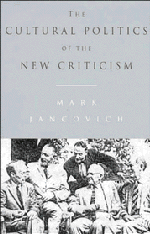Book contents
- Frontmatter
- Contents
- Preface
- List of abbreviations
- Part I The New Criticism and its critics
- Part II The formation of the New Criticism
- Introduction
- 4 John Crowe Ransom: the social relations of aesthetic activity
- 5 Allen Tate: the social organization of literature
- 6 Robert Penn Warren: against propaganda and irresponsibility
- Conclusion: the analysis of a Southern poet
- Part III The establishment of the New Criticism
- Part IV The development of the New Criticism
- Conclusion: Modernism and postmodernism within the American academy
- Conclusion
- Notes
- Bibliography
- Index
- Frontmatter
- Contents
- Preface
- List of abbreviations
- Part I The New Criticism and its critics
- Part II The formation of the New Criticism
- Introduction
- 4 John Crowe Ransom: the social relations of aesthetic activity
- 5 Allen Tate: the social organization of literature
- 6 Robert Penn Warren: against propaganda and irresponsibility
- Conclusion: the analysis of a Southern poet
- Part III The establishment of the New Criticism
- Part IV The development of the New Criticism
- Conclusion: Modernism and postmodernism within the American academy
- Conclusion
- Notes
- Bibliography
- Index
Summary
The literary and cultural criticism produced by Ransom, Tate and Warren has a great deal in common. All three writers drew on Southern paternalism, but they each gave a different inflection to this mode of thinking. Each focused on different problems and developed different formulations. Of the three, Ransom was the most limited. He did claim that aesthetic activity was opposed to the scientific rationalism of industrial capitalism, and believed that the Agrarian society would redeem culture, but he did not conceptualize intermediate responses to industrial capitalism. He called for the end of industrial capitalism and the restoration of pre-capitalist relations without offering political strategies for achieving these objectives. He did become involved in the struggle to institutionalize the New Criticism within the academy, but eventually came to see no alternative to industrial capitalism. Aesthetic activity no longer called for an alternative way of life; it simply became the ‘commemoration’ of a desirable but unobtainable mode of existence.
By contrast, Tate concentrated on the situation of the writer within specific forms of social organization. He wanted to define a social function for the writer which would not limit the critical aspects of literature. To this end, he called for the creation of a profession of letters within America. Not surprisingly, Tate's position was more flexible than that of Ransom. It enabled him to develop interests and activities which were opposed to industrial capitalism, but could exist without the envisaged restoration of the traditional society.
It is Warren's career though which has endured longest and developed most significantly since his involvement with Agrarianism.
- Type
- Chapter
- Information
- The Cultural Politics of the New Criticism , pp. 33 - 34Publisher: Cambridge University PressPrint publication year: 1993



